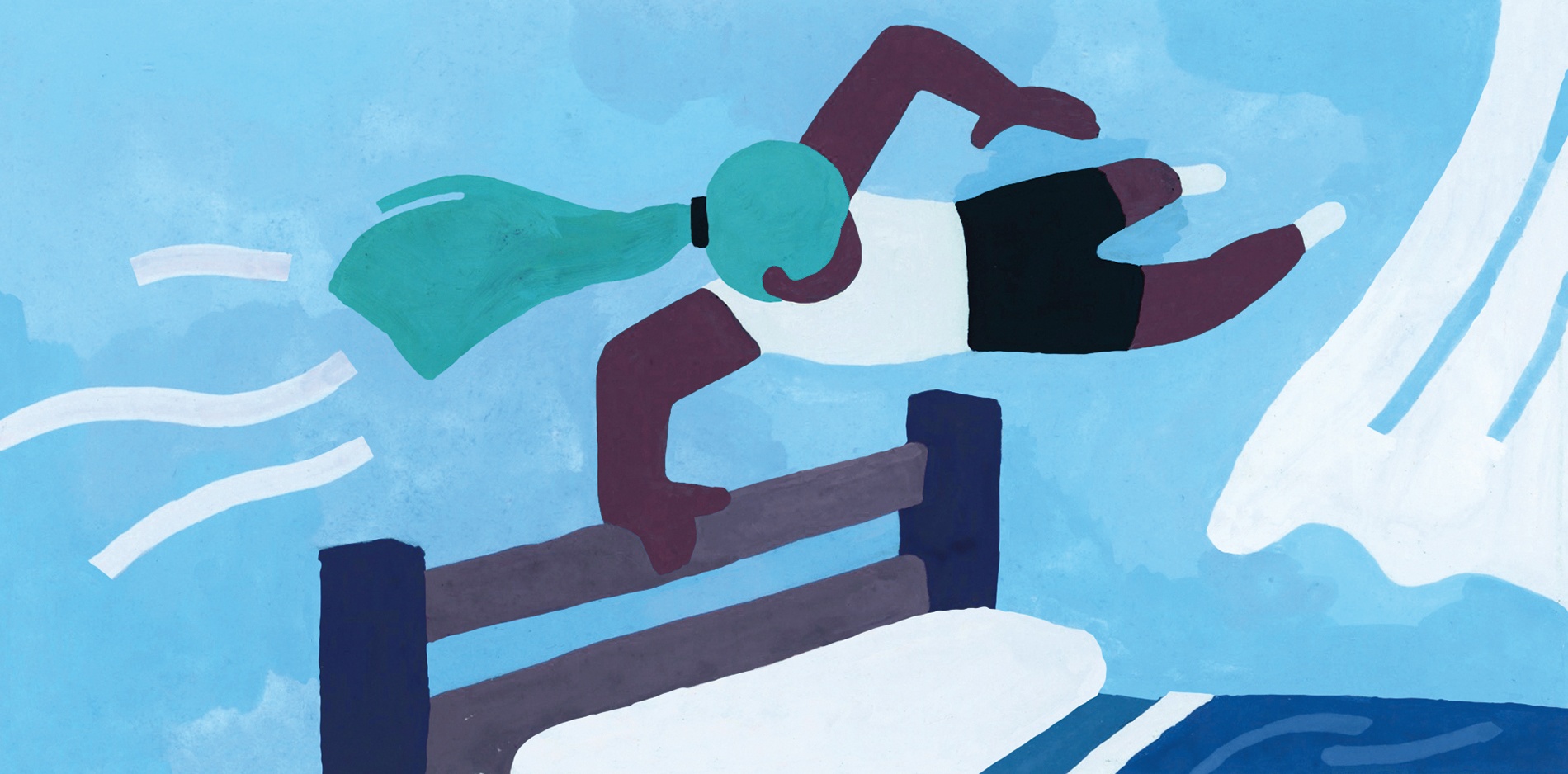
Power Napping
Carskadon protegée Allison Brager ’07 on sleep as a performance enhancer
The first choice college for Allison Brager ’07 was West Point, but after the 9/11 attacks the valedictorian and track star’s parents took military academy off the table. Brager came to Brown on a recruiting trip and was struck by how much Providence reminded her of her native Youngstown, OH, which then had one of the highest per capita murder rates in the U.S. “We also had a mob that was pretty well known,” Brager told me on the phone in between crossing military checkpoints in North Carolina, where she now works as an Army neuroscientist, helping select and train Special Operations forces. “Compared to the other Ivies, Providence felt like home.”
At Brown she dove headfirst into hours of daily training, weekly competitions, and an indoor and outdoor varsity track and field schedule that never had an offseason. She took Introduction to Sleep taught by Professor Mary Carskadon, she admits, because she thought it would be easy. It ended up turning into her life’s work. In June 2021, over two decades after she got her first introduction to sleep in Carskadon’s course, Brager was a semi-finalist to be an astronaut, one of 120 applicants selected out of an initial pool of 12,000. Her pitch? “I could be one of the first sleep researchers to truly study what impact space travel has on the human body and human sleep.”
Brager says her background in the humanities has allowed her to be an “out of the box” thinker in the sciences, and later in the military, where she’s served since 2017. “If you think about a college education that is the absolute antithesis of a West Point education, it’s Brown.” Brager says.
In 2006, the summer before her senior year, Brager was an apprentice at Carskadon’s “sleep camp” (see Sleep Secrets) and worked on an experiment to study the impacts of alcohol on sleep. After that apprenticeship, Brager knew that she wanted to get a doctorate in sleep research, but she also knew that she wasn’t ready to leave behind a career as an athlete. (She still isn’t—she’s been a member of the U.S. Army Warrior Fitness Team, started an LGBTQ+ kickball league at Fort Knox, and won three gold medals at the Gay Games in Guadalajara, Mexico last November.) So in grad school, at Kent State University, she studied how exercise impacts the release of serotonin. Then, as a postdoc at Morehouse School of Medicine, she and her research team found a sleep-regulating gene in skeletal muscle.
Brager then turned to doing research work on sleep for the Department of Defense, eventually becoming the chief of the Sleep Research Center at Walter Reed. And in 2017, she decided to enlist in the U.S. Army—her lifelong dream.
Working at the intersection of sleep and athleticism, Brager is showing fellow service members why sleep is so important to health, well-being and the military itself.
Vincent Capaldi ’02, ’03 ScM, ’07 MD was one of Brager’s mentors in the military from the very beginning. A fellow sleep researcher, he also got his start in sleep science from Carskadon’s lab. Later, as a Program in Liberal Medical Education student, he got his medical degree from Brown. Now, he is the chair of psychiatry at Uniformed Services University, a federal university focused on military health care.
For the military, sleep has become a critical field of research. Working at the intersection of sleep and athleticism, Brager is showing fellow service members why sleep is so important to health, well-being and the military itself. “Our ability to think and process critical pieces of information quickly is key to keeping us alive,” Capaldi says.
In Brager’s 2015 book Meathead: Unraveling the Athletic Brain, she lays out the interactions between exercise and brain health and the importance of sleep on athletic performance. The book is her way of refuting some of her old Brown classmates, who called her and her fellow athletes derogatory terms like “dumb jock” or “meathead.”
After Brown, Brager saw the opposite: so many of her athletic peers were having exceptional success in professional school or in the business world. “It got me thinking about neuroplasticity and adaptive changes that happen at the level of the brain because of exercise,” she said.
The book reports that elite athletes are better able to multitask and communicate between different regions of the brain. She also makes the case that the elevated serotonin release that accompanies exercise makes athletes more sociable and emotionally intelligent than their non-athlete peers. And Brager shows that sleep significantly impacts athletic performance, and points to a series of studies that show that flying across time zones can have deleterious impacts on an athlete’s ability to perform in sport.
The book’s conclusion is more radical, and a precursor to the research that Brager does now, as a military scientist who helps select and guide targeted interventions for special ops. How do our genes impact athletic performance and sleep? What if a scientist could turn the genes on and off like flipping a switch, drastically reducing the amount of sleep a person needs to as little as four hours per night?
Brager says that she is going to put her hat in the ring again for the next astronaut application cycle. “I’m over the moon with that and how close she came the first time around,” Carskadon says. “I’ve been a space travel aficionado for decades, and when Allison told me she was applying to be an astronaut she promised me she would give me a ticket to her launch.”




